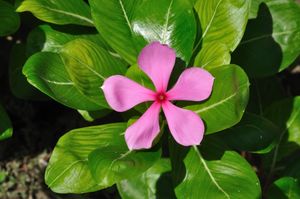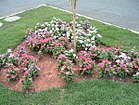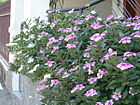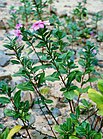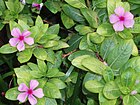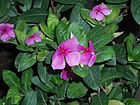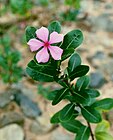Note: This is a project under development. The articles on this wiki are just being initiated and broadly incomplete. You can Help creating new pages.
Difference between revisions of "Catharanthus roseus - Sada Bahar"
(→External Links) |
(→References) |
||
| (19 intermediate revisions by 2 users not shown) | |||
| Line 1: | Line 1: | ||
[[File:Catharanthus roseus 6576.JPG|thumb|right|''Sada Bahar'']] | [[File:Catharanthus roseus 6576.JPG|thumb|right|''Sada Bahar'']] | ||
| − | + | '''Catharanthus roseus''' is a genus of flowering plant in the family Apocynaceae. It is native and endemic to Madagascar, but grown elsewhere as an ornamental and medicinal plant, It is a source of the drugs vincristine and vinblastine, used to treat cancer. | |
| − | ''' | ||
| − | |||
==Uses== | ==Uses== | ||
| − | {{Uses| | + | {{Uses|Blood pressure}}, {{Uses|Lung cancer}}, {{Uses|Leukaemia}}, {{Uses|Dysentery}}, {{Uses|Diarrhoea}}, {{Uses|Hodgkin’s lymphoma}}, {{Uses|Diarrhea}}, {{Uses|Bleeding hemorrhoids}}<ref name="Karnataka Medicinal Plants"/> |
==Parts Used== | ==Parts Used== | ||
| − | {{Parts Used| | + | {{Parts Used|Leaf}}, {{Parts Used|Root}}<ref name="Karnataka Medicinal Plants"/> |
==Chemical Composition== | ==Chemical Composition== | ||
| − | Indole, | + | Indole, Indoline alkaloids, Ajmalicine, Lochnerine, Serpentine.<ref name="chemical composition"/> |
==Common names== | ==Common names== | ||
| − | {{Common names|kn=|ml=Shavam Naari| | + | {{Common names|kn=Vishakanigalu, Kaasi kanigalu, Smashaana mallige|sa=Sadapushpi|ml=Shavam Naari|hi=Sadabahar|ta=Nityakalyani|te=Billaganneru|en=Periwinkle, Madagascar periwinkle}} |
==Properties== | ==Properties== | ||
| Line 32: | Line 30: | ||
==Habit== | ==Habit== | ||
| − | {{Habit| | + | {{Habit|Ornamental herb}} |
==Identification== | ==Identification== | ||
===Leaf=== | ===Leaf=== | ||
| − | {{Leaf|Simple| | + | {{Leaf|Simple|Opposite|The leaves are lobed or unlobed but not separated into leaflets}}<ref name="Leaf"/> |
===Flower=== | ===Flower=== | ||
| − | {{Flower|Unisexual|2-4cm long| | + | {{Flower|Unisexual|2-4cm long|Pink to red, white|5|Flowering throughout the year}} |
===Fruit=== | ===Fruit=== | ||
| − | {{Fruit|General|10–50 mm|The fruit is dry and splits open when ripe||-}} | + | {{Fruit|General|10–50 mm|The fruit is dry and splits open when ripe|-|-|Fruiting throughout the year}} |
===Other features=== | ===Other features=== | ||
==List of Ayurvedic medicine in which the herb is used== | ==List of Ayurvedic medicine in which the herb is used== | ||
| − | |||
==Where to get the saplings== | ==Where to get the saplings== | ||
| Line 54: | Line 51: | ||
==How to plant/cultivate== | ==How to plant/cultivate== | ||
| − | Vinca or Periwinkle will grow in range of light conditions, from full sun to shade. They will do well in average soils | + | Vinca or Periwinkle will grow in range of light conditions, from full sun to shade. They will do well in average soils.<ref name="How to plant/cultivate"/> |
==Commonly seen growing in areas== | ==Commonly seen growing in areas== | ||
| Line 74: | Line 71: | ||
==References== | ==References== | ||
| + | <references> | ||
| + | <ref name="chemical composition">[http://www.yourarticlelibrary.com/biology/alkaloid/vinca-sources-macroscopical-character-and-uses-with-diagram/49664 Chemical constituents]</ref> | ||
| − | + | <ref name="Leaf">[https://gobotany.newenglandwild.org/species/vinca/major/ Plant desription]</ref> | |
| − | <ref name=" | ||
| − | <ref name=" | + | <ref name="How to plant/cultivate">[http://www.gardenersnet.com/flower/vincaperiwinkle.htm How to Grow Vinca]</ref> |
| − | <ref name=" | + | <ref name="Karnataka Medicinal Plants">Karnataka Medicinal Plants Volume - 2” by Dr.M. R. Gurudeva, Page No.197, Published by Divyachandra Prakashana, #45, Paapannana Tota, 1st Main road, Basaveshwara Nagara, Bengaluru.</ref> |
</references> | </references> | ||
| Line 87: | Line 85: | ||
* [https://www.sciencedirect.com/topics/agricultural-and-biological-sciences/catharanthus-roseus Vinca on science direct] | * [https://www.sciencedirect.com/topics/agricultural-and-biological-sciences/catharanthus-roseus Vinca on science direct] | ||
* [http://www.flowersofindia.net/catalog/slides/Periwinkle.html Vinca on flowersofindia.net] | * [http://www.flowersofindia.net/catalog/slides/Periwinkle.html Vinca on flowersofindia.net] | ||
| − | * [http://naturalhomeremedies.co/Periwinkle-health-benefits-and-home-remedies.html Vinca on ] | + | * [http://naturalhomeremedies.co/Periwinkle-health-benefits-and-home-remedies.html Vinca on naturalhomeremedies.com] |
Latest revision as of 12:10, 8 March 2023
Catharanthus roseus is a genus of flowering plant in the family Apocynaceae. It is native and endemic to Madagascar, but grown elsewhere as an ornamental and medicinal plant, It is a source of the drugs vincristine and vinblastine, used to treat cancer.
Contents
- 1 Uses
- 2 Parts Used
- 3 Chemical Composition
- 4 Common names
- 5 Properties
- 6 Habit
- 7 Identification
- 8 List of Ayurvedic medicine in which the herb is used
- 9 Where to get the saplings
- 10 Mode of Propagation
- 11 How to plant/cultivate
- 12 Commonly seen growing in areas
- 13 Photo Gallery
- 14 References
- 15 External Links
Uses
Blood pressure, Lung cancer, Leukaemia, Dysentery, Diarrhoea, Hodgkin’s lymphoma, Diarrhea, Bleeding hemorrhoids[1]
Parts Used
Chemical Composition
Indole, Indoline alkaloids, Ajmalicine, Lochnerine, Serpentine.[2]
Common names
| Language | Common name |
|---|---|
| Kannada | Vishakanigalu, Kaasi kanigalu, Smashaana mallige |
| Hindi | Sadabahar |
| Malayalam | Shavam Naari |
| Tamil | Nityakalyani |
| Telugu | Billaganneru |
| Marathi | NA |
| Gujarathi | NA |
| Punjabi | NA |
| Kashmiri | NA |
| Sanskrit | Sadapushpi |
| English | Periwinkle, Madagascar periwinkle |
Properties
Reference: Dravya - Substance, Rasa - Taste, Guna - Qualities, Veerya - Potency, Vipaka - Post-digesion effect, Karma - Pharmacological activity, Prabhava - Therepeutics.
Dravya
Rasa
Tikta (Bitter), Kashaya (Astringent)
Guna
Laghu (Light), Ruksha (Dry), Tikshna (Sharp)
Veerya
Ushna (Hot)
Vipaka
Katu (Pungent)
Karma
Kapha, Vata
Prabhava
Habit
Identification
Leaf
| Kind | Shape | Feature |
|---|---|---|
| Simple | Opposite | The leaves are lobed or unlobed but not separated into leaflets |
Flower
| Type | Size | Color and composition | Stamen | More information |
|---|---|---|---|---|
| Unisexual | 2-4cm long | Pink to red, white | 5 | Flowering throughout the year |
Fruit
| Type | Size | Mass | Appearance | Seeds | More information |
|---|---|---|---|---|---|
| General | 10–50 mm | The fruit is dry and splits open when ripe | - | - | Fruiting throughout the year |
Other features
List of Ayurvedic medicine in which the herb is used
Where to get the saplings
Mode of Propagation
How to plant/cultivate
Vinca or Periwinkle will grow in range of light conditions, from full sun to shade. They will do well in average soils.[4]
Commonly seen growing in areas
Ornamental plant in gardens, Under trees and bushes, Parks and cemeteries.
Photo Gallery
References
- ↑ 1.0 1.1 Karnataka Medicinal Plants Volume - 2” by Dr.M. R. Gurudeva, Page No.197, Published by Divyachandra Prakashana, #45, Paapannana Tota, 1st Main road, Basaveshwara Nagara, Bengaluru.
- ↑ Chemical constituents
- ↑ Plant desription
- ↑ How to Grow Vinca
External Links
- Ayurvedic Herbs known to be helpful to treat Blood pressure
- Ayurvedic Herbs known to be helpful to treat Lung cancer
- Ayurvedic Herbs known to be helpful to treat Leukaemia
- Ayurvedic Herbs known to be helpful to treat Dysentery
- Ayurvedic Herbs known to be helpful to treat Diarrhoea
- Ayurvedic Herbs known to be helpful to treat Hodgkin’s lymphoma
- Ayurvedic Herbs known to be helpful to treat Diarrhea
- Ayurvedic Herbs known to be helpful to treat Bleeding hemorrhoids
- Herbs with Leaf used in medicine
- Herbs with Root used in medicine
- Herbs with common name in Kannada
- Herbs with common name in Hindi
- Herbs with common name in Malayalam
- Herbs with common name in Tamil
- Herbs with common name in Telugu
- Herbs with common name in Sanskrit
- Herbs with common name in English
- Habit - Ornamental herb
- Index of Plants which can be propagated by Seeds
- Index of Plants which can be propagated by Cuttings
- Herbs that are commonly seen in the region of Ornamental plant in gardens
- Herbs that are commonly seen in the region of Under trees and bushes
- Herbs that are commonly seen in the region of Parks and cemeteries
- Herbs
- Ayurvedic herbs that don't have seed photos
- Apocynaceae
